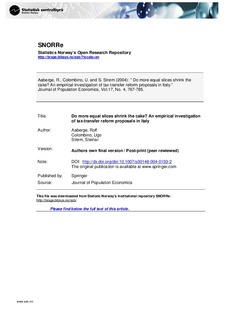Do more equal slices shrink the cake? An empirical investigation of tax-transfer reform proposals in Italy
Journal article, Peer reviewed
Permanent lenke
http://hdl.handle.net/11250/177996Utgivelsesdato
2004Metadata
Vis full innførselSamlinger
Originalversjon
Journal of Population Economics, Vol. 17, Nr. 4, 767-785Sammendrag
A crucial issue in efficiency-equality evaluations of tax reforms resides in the possibility that the level as well as the distribution of welfare may change, where the household-specific measures of welfare capture the value of income as well as the value of leisure. A better-designed redistribution and income support system may not only foster equality but also improve the configuration of incentives and by this route contribute in its turn to efficiency. This paper presents an empirical analysis of the welfare effects for married couples of replacing the Italian tax system by three alternative hypothetical reforms: a flat tax, a negative income tax, and a work fare scheme. We employ a microeconometric model of household labour supply that represents partners simultaneous choices, allows for constraints in the choice of hours of work, and is sufficiently flexible to capture a large variety of supply responses. These features appear to be crucial in the evaluation of reform effects. The results suggest that there is scope for improving upon the current system under both the efficiency and the equality criterion. The benefits from the reforms, however, come from unexpected directions since the largest labour supply contribution come from poor and middle class households whereas rich households appear to be much less responsive to changes in the tax rates. The simulation results reveal that a crucial role in shaping the results is played by the relatively higher behavioural responsiveness of married women living in low and average income households.
Beskrivelse
Authors own final version (peer reviewed). The original publication is available at www.springer.com
